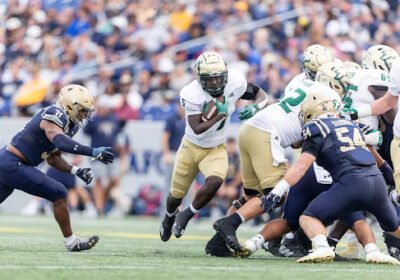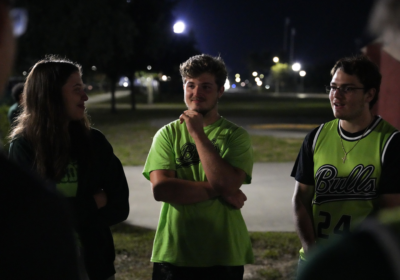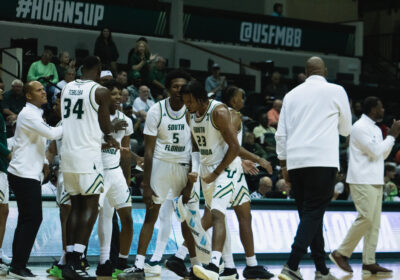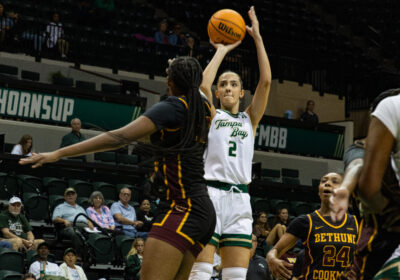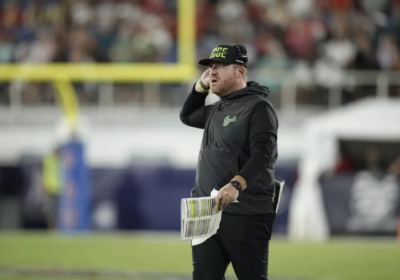A lifesaving gift

Born with Alport's Syndrome, Joey Ricchman (left) need a kidney transplant. Local MMA fighter Mike Miller (right) answered the call after reading about Richman's story on social media. SPECIAL O THE ORACLE
Sitting in his hospital bed at Florida Hospital Tampa, Joey Richman’s face turned white as he looked down at his body, hooked up to a machine that administered dialysis treatment to his kidneys to keep him alive.
Richman lifted his face to meet the gaze of his family with a clear look of defeat.
After 22 years of being told he would never need to be put on dialysis, he ran into an unexpected obstacle when his younger brother Jason was told he couldn’t donate his kidney. Mere days before the scheduled surgery, the transplant was cancelled due to Jason’s expression of interest in joining the Army in the future.
Afflicted with Alport's Syndrome since birth, a genetic condition that causes loss of hearing and kidney function, Richman had pushed his body to the limit as his kidneys failed on him, patiently waiting for his brother’s kidney to save him. Left with no options, he was forced to undergo immediate surgery to be put on dialysis.
“I'm used to being able to push through whatever I need to and at that point it was just completely out of my hands,” Richman said. “It was hitting everyone; it wasn’t just affecting me, it was affecting my brother because he had to watch this and he tried his hardest to do it and it was just completely taken away from all of us, so that was one of the harder moments we’ve had with all of us.”
Richman was left to face a stark reality: he was in a race against time.
His doctors couldn’t estimate just how long he had left, but according to The National Kidney Foundation, the average dialysis patient has anywhere between five and 10 years before their body shuts down.
Tracing back to his great-grandmother, the first known carrier of Alport in his family, Richman would be the first male survivor of the disease in his family history.
With a long waiting list for a kidney donation in front of him, his mother Dana took matters into her own hands on social media.
Richman had lost thirty pounds from going through 24/7 dialysis treatment over the first five weeks and doctors told Dana if she wanted to ensure her son’s survival, she needed to start looking for a donor on her own.
“I started putting it out to the public last July that he might need a living donor,” Dana said. “I was doing it as a backup plan in case it didn’t work out with family, so we got it going in motion and it was listing him with more and more hospitals. But then January is when it became critical.
“Now it was like ‘Alright now you’re on dialysis and the longer you’re on dialysis, the crappier your chances are with the new kidney,’ so it was a lot all at once.”
She took to Facebook and Twitter, spending hours on end reaching out to the community for help using #AKidneyForJoey. After roughly a week of nonstop social media management, Dana’s message for help was met with overwhelming support.
At first her efforts received little feedback, but near the end of her week-long social media marathon, her posts began to pick up momentum.
“It was probably one of the best feelings in the whole experience,” Richman said. “It’s funny, because you hear about the numbers of the people on the waiting list and how few donors there are, but then you see all these people who want to help once they find out about it. It was kind of a reassuring moment that showed me the good in humanity.”
But even with 20-40 potential donors calling per day, doctors had trouble finding a match for Richman.
Nearly 100 potential donors ran into difficulties in the application and matching process and after two months of searching, the Richman’s still had no donor in place.
***
On March 2, Mike Miller was scrolling through Facebook during his lunch break at work when he came across Dana’s page for Joey and was instantly drawn to the story.
“After a few minutes of reading up on it, I felt the need to step in and help,” Miller said. “So I messaged Dana and decided the next morning I would do the blood test, and the rest is history.
“The feeling I got was indescribable, I’ve never felt it before. There was no doubt that it was supposed to be me doing this.”
After getting in contact with Dana, Miller was told he had to sleep on his decision before making it official. Two days later, he was in a hospital undergoing tests to see if he would be a match for Richman.
To the Miller’s surprise, after the countless dead ends and tie-ups along the way, he was cleared to be a living donor for Richman almost immediately.
Miller, 25, is an MMA fighter with a career 3-1 record. He was set to continue fighting over the summer, but will now have to give up any future in fighting after donating his kidney.
Along with forfeiting his fighting career, Miller will have to closely monitor his health and likely have a slightly reduced lifespan.
“That’s OK though, you sacrifice a little bit and you give someone else a whole lot more,” Miller said. “What he’s gaining is so much more than what I’m losing. I’m not going to be leaving mixed martial arts altogether, I’m going to be coaching, reffing and still mentoring my guys. I’ll still be sharpening my skills, just not using them on anyone anymore.”
Despite not knowing Richman prior to reading about his need for a kidney, Miller had little hesitation along the six-week journey from commitment to surgery.
“I didn’t wake up that morning, or any morning, saying, ‘Yeah, I’m going to donate a kidney or an organ or something,’” Miller said. “It was just in the moment, in that minute. The hard part was, before anyone knew about this, it was, ‘Am I crazy? Do people actually do this?’ And then how much convincing will I have to do to convince people this is the right thing? But the story kind of validated itself, so I didn’t have to do much talking.”
Miller and the Richman family first connected when they visited him at his gym where he trained. Upon walking in, they were first met with questioning glances, but Miller helped them feel welcome.
The family watched him spar and train before an interview to see if both parties were fit for the upcoming surgery.
“It was the first time we had done an interview in the same room,” Richman said. “I think him hearing what I had to say and then me getting to hear what he had to say, it made it real. We were just talking on the fly and saying we were family and brothers. We were matching up so well and it made everyone realize we feel exactly the same even though we don’t really know each other.”
In the time leading up to the surgery, Miller and the Richman family bonded over dinners, kayaking and the regular visits to the doctor.
After the time they’ve spent together and the journey they’ve committed to go on together, the two consider each other as brothers.
“It was like we had known each other a long time before meeting,” Miller said. “There was never that awkward moment, we just meshed from the beginning.”
Since the surgery on Wednesday, there is now little left standing in the way between Richman and a chance at a healthy life. A USF pre-med student working toward obtaining his law degree, he hopes to return to campus once healed from surgery.
As long as his body doesn’t reject the kidney, Richman will have to endure a recovery process of a few months before returning to full health.
He most looks forward to going back to the beach, the gym, and just doing normal things and not being tied down to hospital beds and dialysis machines.
His survival and return to a normal life has turned from a dream to a reality because of a selfless act by a man who simply felt called to help.
“I mean I’m a Christian, I’ve always felt everyone has something they’re supposed to do,” Miller said. “But after I felt this, I’m convinced it’s real. I can’t explain it any other way.”
On Wednesday, Richman returned to the hospital bed once more, but this time with a renewed sense of hope for his future.
Planning on returning to campus in the fall, Richman is set to graduate in the coming year and is eager to continue on at USF for medical school, but most of all he’s excited to be healthy for the first time in his life.
“It’s almost hard to imagine because it’s been so gradual that the way I feel now, I feel healthy,” Richman said. “I know I’m not as good as my peers in that sense, but it’s hard for me to imagine being better. This is all I’ve known, so I feel like this is what I’m going to feel like when I wake up. So, I’m looking forward to waking up and seeing how I feel.”



